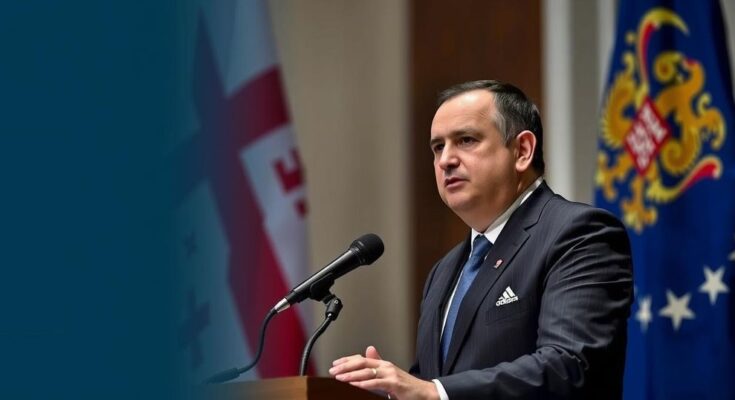Georgian President Salome Zourabichvili has denounced the government as illegitimate and plans to remain in office beyond her term due to accusations of election fraud. Protests have erupted over the ruling party’s decision to suspend EU talks, reflecting widespread dissatisfaction and a push for adherence to constitutional commitments. Tensions mount between the leadership and demonstrators, signaling a pivotal moment in Georgia’s political landscape.
Salome Zourabichvili, the President of Georgia, has declared the current government illegitimate and stated her intention to remain in office beyond her term concluding next month. This position stands in opposition to Prime Minister Irakli Kobakhidze, who has accused opposition forces of organizing a coup. The political climate intensified following Kobakhidze’s announcement that the government would suspend EU accession talks for four years, citing perceived coercion from the European Union.
The decision to halt these critical talks has provoked widespread unrest among the populace, who overwhelmingly support EU membership as a constitutional goal. Following Kobakhidze’s remarks, large protests emerged across the nation, signaling the public’s frustration and rejection of the government’s direction. In a recent speech, Zourabichvili asserted that the election, which resulted in a near 54% victory for the ruling Georgian Dream party, was fraudulent. She emphasized that a parliament formed through questionable means lacks the authority to elect her successor, thereby extending her mandate until a legitimately elected body can be established.
Simultaneously, Kobakhidze charged opponents with attempting to instigate a rebellion akin to Ukraine’s 2014 Maidan protests, dismissing this idea as unfeasible in Georgia. Protesters clashed with law enforcement in Tbilisi, leading to a significant police presence, and over 100 arrests were made. Opposition to the suspension of EU talks has transcended political divides, with several officials resigning in protest and public figures voicing their support for demonstrators. Notably, Khvicha Kvaratskhelia, an emblematic figure from Georgia’s national football team, expressed solidarity with the protesters, underscoring the emotional toll the situation is taking on citizens.
As the domestic and international political landscape becomes increasingly turbulent, civil servants and professional stakeholders have reiterated the importance of adhering to the constitutional framework regarding EU ambitions. The conflict between Georgian Dream and its adversaries is emblematic of growing tensions between the need for democratic governance and the desire to maintain international alliances amidst internal dissent and division.
The current political unrest in Georgia stems from a deep-seated conflict between the ruling Georgian Dream party and the pro-European opposition. Amidst aspirations for European Union membership, the Georgian Dream government has faced criticism for its alleged authoritarianism and closeness to Russia. The suspension of EU accession talks has escalated tensions, signaling a potential shift away from a pro-EU stance long ingrained in the country’s politics. Citizens are increasingly vocal about their displeasure, leading to widespread demonstrations across the country, which highlight their commitment to EU integration and democratic principles.
The ongoing political crisis in Georgia highlights a significant struggle between the government and pro-EU opposition, driven by fears of authoritarianism and a pivot towards Russia. President Salome Zourabichvili’s refusal to relinquish her position amid allegations of a rigged election illustrates the deep divisions within Georgian politics. As protests unfold, the fight for democracy and EU integration grows more critical, potentially shaping Georgia’s future relations with the West and the ongoing stability of its governance.
Original Source: www.theguardian.com




